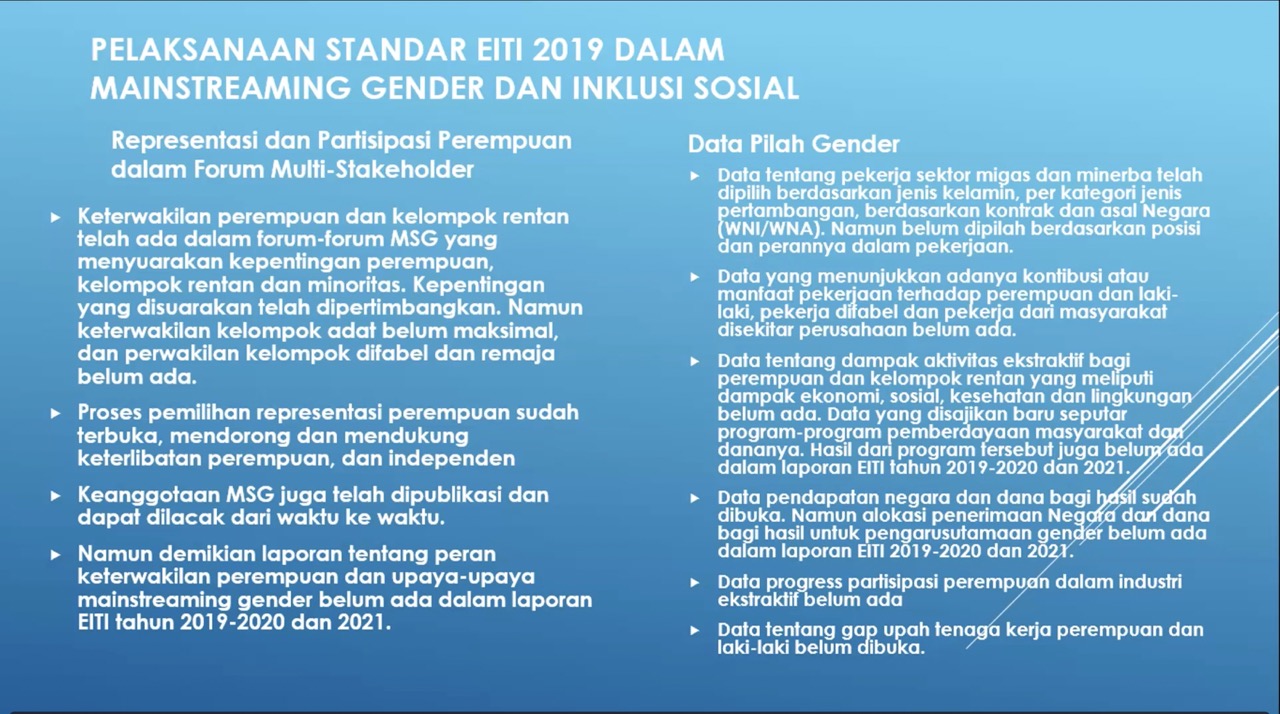Jakarta – Publish What You Pay (PWYP) Indonesia in collaboration with representatives of Civil Society Organizations (CSOs) in the Extractive Industry Transparency Initiative (EITI) Indonesia Multi-Stakeholder Group (MSG) held a PWYP Knowledge Forum (PKF) entitled “Implementation of the EITI Standard in promoting Gender Equality in Indonesia’s Just Energy Transition” on August 9, 2023, online. Present as resource persons at this discussion included Yusnita Ike Christanti, CSO Representative in MSG EITI Indonesia; Wasingatu Zakiyah, Gender Equality Disability Social Inclusion (GEDSI) Expert; and Sri Andhayani, Head of Human Resources and General Division of PT Nusantara Regas.
PKF is a discussion and knowledge-sharing forum organized regularly by the PWYP Indonesia coalition to increase understanding and capacity and develop public discourse on issues, topics, and policies in the natural resources sector.
This PKF aims to develop gender mainstreaming discourse to encourage a just energy transition in Indonesia. Discuss various opportunities for implementing the 2023 EITI standard at the company level. Enhance gender mainstreaming in Indonesia’s extractive sector and energy transition, and convey notes on implementing the 2019 EITI Standard in mainstreaming Gender and Social Inclusion in Indonesia.
 In Indonesia, gender mainstreaming in the extractive sector is regulated by the EITI Standard, a global standard for extractive sector transparency, especially in oil, gas, minerals, and coal. Indonesia is an EITI-implementing country that joined the initiative in 2010 by issuing Presidential Regulation No. 26 of 2010 concerning Transparency of State and Regional Revenues obtained from Extractive Industries. Through EITI, the extractive sector in Indonesia is also encouraged to carry out gender mainstreaming and social inclusion in addition to striving for natural resource governance that holds transparent and accountable principles.
In Indonesia, gender mainstreaming in the extractive sector is regulated by the EITI Standard, a global standard for extractive sector transparency, especially in oil, gas, minerals, and coal. Indonesia is an EITI-implementing country that joined the initiative in 2010 by issuing Presidential Regulation No. 26 of 2010 concerning Transparency of State and Regional Revenues obtained from Extractive Industries. Through EITI, the extractive sector in Indonesia is also encouraged to carry out gender mainstreaming and social inclusion in addition to striving for natural resource governance that holds transparent and accountable principles.
Aryanto Nugroho, PWYP Indonesia National Coordinator, opened this discussion by conveying that EITI has now developed not only talking about transparency and accountability of the extractive industry sector but has linked the energy transition and the principles of gender equality, disability, and social inclusion. EITI Standard 2023 is the basis for companies in the extractive industry and energy sector to optimize the implementation of gender equality and social inclusion policies.
Yusnita Ike Christanti presented notes on implementing the 2019 EITI Standard in mainstreaming gender and social inclusion in Indonesia. Representation and Participation of Women and vulnerable groups have existed in MSG EITI forums that voice the interests of women, vulnerable groups, and minorities, and the claims said have been considered. However, representation of indigenous peoples, disabled groups, and youth has not been included. The results of the analysis of the 2019-2020 Indonesia EITI Report and the 2021 Indonesia EITI Report show that the role of women’s representation and gender mainstreaming efforts have not been raised.
Yusnita also presented recommendations for gender mainstreaming and social inclusion in implementing EITI. Among them is that community representation and participation can be expanded in MSG meetings and consultations by considering gender, sexual orientation, ethnicity, race, economic class, location, age, and custom. Participation can also involve the media and women’s associations, significantly affecting communities.
Another recommendation is the need to develop data related to the impact of extractive activities on women and vulnerable groups, which include economic, social, health, and environmental effects, so that they can be included in the EITI Report, including data on the progress of women’s participation in the extractive industry.
Wasingatu Zakiah, GEDSI Expert, explained gender mainstreaming in energy companies. In general, there are strategies to encourage gender equality, including mainstreaming, special protection for vulnerable groups, and affirmative steps in the form of specific quotas given directly to women and vulnerable groups.
There are seven prerequisites for implementing the GEDSI principles: commitment, policy, institutions, human resources, disaggregated data, monitoring and evaluation analysis, and the role of the community. For companies, leadership commitment is needed to implement GEDSI, and responsibility can be made from the top policy to the technical divisions within the company.
Sri Andhayani, Head of HR & General Division of PT Nusantara Regas, conveyed the company’s perspective in implementing gender mainstreaming. PT Nusantara Regas has made efforts to optimize gender equality policies through the Pertiwi Development Program, which is held to increase employee awareness of gender equality and commitment to Zero harassment in the company.
The 2023 EITI Standard seeks to improve gender mainstreaming by increasing the number of prerequisites and scope. The 2019 standard regulates at least four sizes (1.4; 6.3; 7.1; 7.4), while in the 2023 standard, there are seven scopes (1.4; 2.2; 5.3; 6.1; 6.3; 6.4; 7.1) related to Multi-Stakeholder Group; contracts and licenses; revenue and expenditure management, social expenditures and environmental payments; economic contribution; environmental and social impacts of extractive activities; and public debate.
In the 2023 EITI Standard, social, economic, and environmental impacts that consider gender equality receive more attention. In addition, the latest aspect different from the previous standard is the inclusion of gender mainstreaming in contracts and licenses and revenue and expenditure management.
In the latest standard, EITI also directs that the consultation process in the licensing process between companies and affected communities has represented representation that holds the principle of equality by displaying gender-disaggregated data. In addition, it also encourages gender-disaggregated data for extractive industry beneficiaries.
Author: Chitra Regina Apris
Reviewer: Aryanto Nugroho